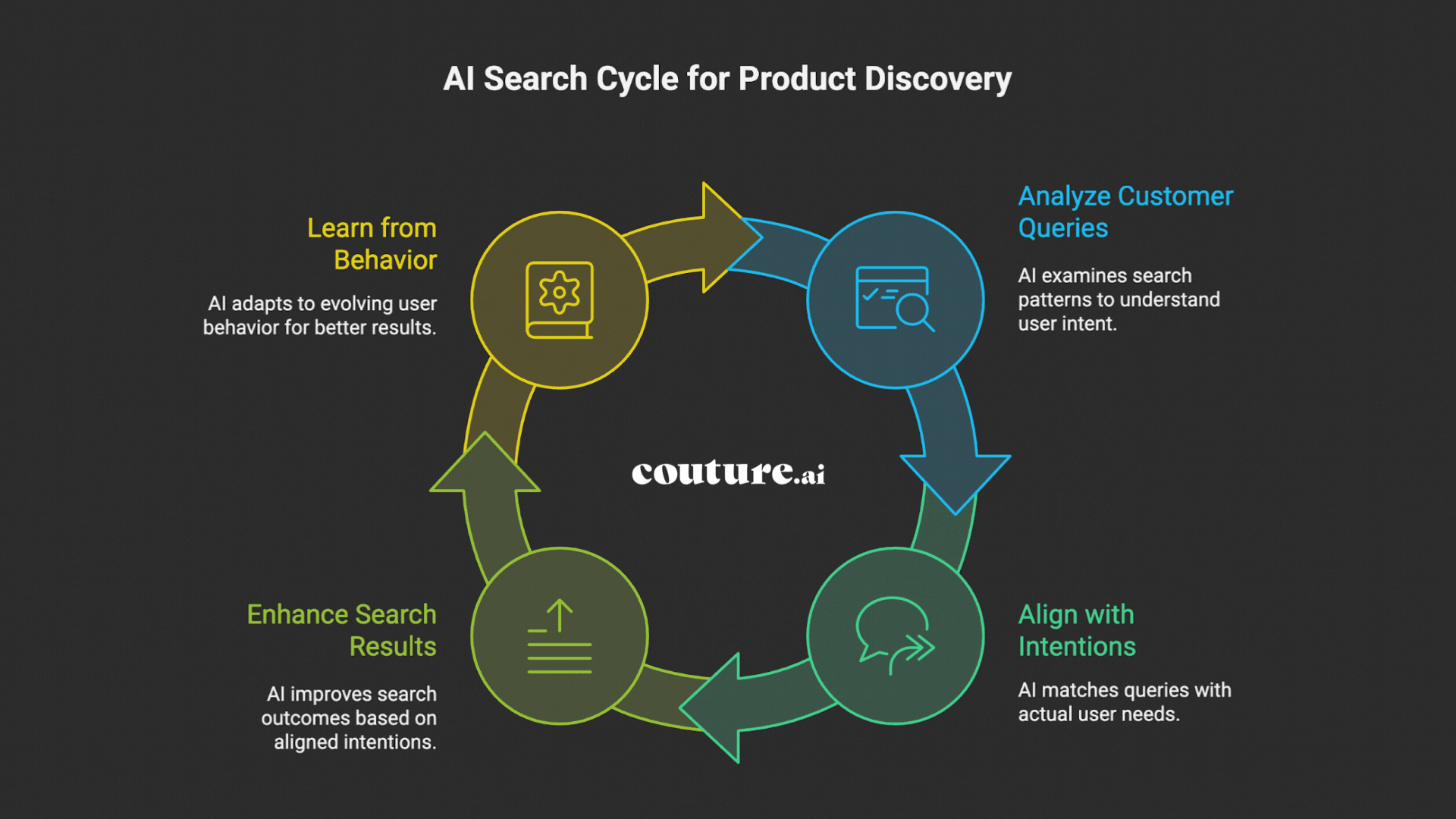Aug 05, 2025 | Couture AI Team
Your customer just spent three minutes searching for "breathable workout tops for yoga" on your D2C store. Your search returned zero results.
But you carry twelve products that match perfectly - they're just categorized under "activewear," tagged as "moisture-wicking," and described as "performance fabric."
This disconnect happens thousands of times daily across D2C stores. Customers know what they want. Your products exist. But traditional search can't bridge the gap between customer language and product catalogs.
AI search solves this fundamental problem by understanding what customers mean, not just what they type.
Your customers don't think like your product catalog.
They search for "birthday gift for mom," while you categorize products as "jewelry > necklaces > sterling silver." They want "something for sensitive skin," but your filters only show "hypoallergenic" or "dermatologist tested."
This disconnect costs you sales every single day.
Traditional search has three major problems:
The result? Many site visitors use your search function, but most of them struggle to find what they need.
AI search learns how your customers shop. It connects the dots between what they type and what they want.
Here's what makes it different:

In 2024, ecommerce brands using AI personalization, including advanced search, reported conversion increases of up to 43% and AOV growth between 15–20%.
Leading D2C brands are seeing measurable improvements with AI-powered search.
JD Sports implemented AI-powered search in 2024, leading to conversion rate improvements between 3% and 23%, reversing a decline in online sales.
Caleres, the parent company of brands like Sam Edelman and Vince, upgraded 13 ecommerce sites with AI search, resulting in a 23% lift in conversions and a 5.5% increase in revenue per visitor.
ASOS uses AI search to recommend matching accessories, increasing AOV.
Warby Parker offers contextual queries like “glasses for round faces,” which improved engagement and conversion.
The pattern is clear. Better search means better discovery. Better discovery means more sales.
AI search can seriously boost your conversions. See how leading D2C brands are doing it with Couture.ai's intelligent product discovery.
Your product catalog needs rich, searchable metadata. Color, material, size, occasion, style, price range, customer reviews, and behavioral data all feed the AI.
Vector search technology maps products in a multi-dimensional space. Similar items cluster together. The AI learns these relationships and surfaces relevant results even for vague queries.
Machine learning models analyze search patterns, click behavior, purchase history, and seasonal trends. They predict what each customer segment wants to see.
Track these metrics to see real ROI:
Most D2C brands see improvements quickly after implementation. Search conversion rates typically increase significantly. Average order values often grow as well.
Don't just install the technology and walk away. AI search needs ongoing optimization.
Personalization and AI search aren't optional anymore; they're expected.
In 2024, Amazon generated 35% of its revenue from its AI recommendation engine, with customers engaging 29% more and delivering 73% higher lifetime value. x
In 2024, Amazon generated 35% of its revenue from its AI recommendation engine, with customers engaging 29% more and delivering 73% higher lifetime value.
Your customers expect Amazon-level search quality. They want to find products quickly using natural language. They expect personalized recommendations based on their behavior.
AI-powered product discovery consistently delivers a 15%+ sales revenue uplift and turns intent into purchases.
Traditional search can't deliver this experience. AI search can.
The math is simple. Better product discovery leads to higher conversion rates. Higher conversion rates mean more revenue from the same traffic.
Don't let poor search functionality cost you sales. Schedule your free Couture.ai demo today and see how AI-powered search can significantly increase your conversions.
Start with AI search. Your conversion rates will thank you!
Subscribe to get the latest updates and trends in AI, automation, and intelligent solutions — directly in your inbox.
Stay Informed: Insights and Trends from Couture AI
Reduce operational complexity, improve planning accuracy, and deliver smarter retail execution with Couture AI.